For your morning wedding, you've got plenty of budget-friendly officiant options. Consider asking a friend or family member to get ordained online, or reach out to local community leaders like mayors or council members. Retired clergy members often offer lower rates, while a Justice of the Peace provides a cost-effective civil ceremony. Online ordination services and celebrants-in-training can be affordable choices too. Don't forget about religious organization volunteers, humanist celebrants, or military chaplains if applicable. Each option offers unique benefits, from personalization to potential cost savings. Exploring these alternatives could lead you to the perfect officiant for your special day.
Key Takeaways
- Online ordination allows a friend or family member to officiate, offering a personal touch at minimal cost.
- Community leaders like mayors, council members, or religious representatives often provide affordable officiant services.
- Justice of the Peace or Notary Publics offer budget-friendly civil ceremonies with fees typically under $150.
- University chaplains and religious organization volunteers can officiate weddings at reduced rates or for free.
- Courthouse ceremonies provide a simple, cost-effective option performed by judges or justices of the peace.
Friend or Family Ordination

One of the most cost-effective and personal ways to officiate your wedding is by asking a close friend or family member to get ordained. This option allows you to have someone who knows you well lead your ceremony, adding a unique and intimate touch to your special day.
To pursue this route, start by selecting someone you trust who's comfortable speaking in public. Discuss your expectations and confirm they're willing to take on this responsibility.
Once you've chosen your officiant, they'll need to get ordained. Many online organizations offer quick and easy ordination processes, often for free or a small fee.
Your chosen officiant should familiarize themselves with local marriage laws, as requirements vary by state. They may need to register with the county clerk's office or obtain a temporary officiant license. It's essential to confirm these details well in advance to avoid any legal issues.
Work closely with your officiant to craft a personalized ceremony that reflects your relationship and values. Provide them with resources and examples of wedding scripts to help guide their preparation.
Remember to schedule a rehearsal to confirm everything runs smoothly on your big day.
Local Community Leaders
When searching for a budget-friendly wedding officiant, don't overlook local community leaders.
You might consider asking civic leaders, such as mayors or council members, who often have the authority to perform marriages.
Additionally, you could reach out to religious community representatives or neighborhood association presidents who may be willing to officiate your ceremony at a lower cost than professional wedding officiants.
Civic Leaders as Officiants
Looking beyond the traditional clergy, local civic leaders can serve as budget-friendly wedding officiants. Mayors, city council members, judges, and other elected officials often have the legal authority to perform marriages.
They're typically more affordable than professional wedding officiants and can add a unique touch to your ceremony.
To find a civic leader to officiate your wedding, start by contacting your local city hall or courthouse. Inquire about which officials are available and willing to perform wedding ceremonies. Some may offer this service as part of their public duties, while others might charge a nominal fee.
When you've identified potential officiants, schedule a meeting to discuss your vision for the ceremony. Be sure to ask about their experience, availability, and any associated costs.
Keep in mind that civic leaders may have limited flexibility in their schedules, so book well in advance.
Consider the personality and speaking style of the civic leader when making your choice. You want someone who can deliver a meaningful ceremony that reflects your values and relationship.
Don't hesitate to ask for references or examples of previous ceremonies they've performed.
Religious Community Representatives
Religious community representatives can step up as cost-effective wedding officiants for couples seeking a spiritual ceremony without breaking the bank.
These local leaders often have deep connections to their congregations and can offer a personal touch to your ceremony. You'll find that many religious figures are willing to officiate weddings for a nominal fee or even for free, especially if you're a member of their community.
To explore this option, reach out to leaders in your faith or spiritual practice. This could include pastors, rabbis, imams, or other religious figures. Even if you're not a regular attendee, some may be open to performing your ceremony.
Be sure to discuss their availability, any required premarital counseling, and any expectations they might have.
Keep in mind that some religious leaders may only perform ceremonies in their place of worship, while others are flexible with locations. If you're planning an outdoor or non-traditional venue wedding, clarify this upfront.
Also, consider any specific rituals or traditions you'd like incorporated into your ceremony and discuss these with your chosen officiant to make certain they're comfortable and prepared to include them.
Neighborhood Association Presidents
While often overlooked, neighborhood association presidents and other local community leaders can be excellent candidates for budget-friendly wedding officiants.
These individuals are typically well-respected within the community and may already have experience speaking at public events.
To find a suitable local leader, start by reaching out to your neighborhood association or community council.
You'll likely discover that many of these individuals are licensed to perform marriages or are willing to become ordained for your special day.
They're often more affordable than professional officiants and can add a personal touch to your ceremony.
When approaching a potential officiant, be clear about your expectations and the tone you'd like for your wedding.
Provide them with any specific readings or customs you'd like incorporated.
Remember, they may not have extensive experience with weddings, so be prepared to guide them through the process.
Don't forget to check your state's laws regarding who can legally officiate weddings.
Some states have restrictions on who can perform marriages, so verify your chosen officiant meets all legal requirements before proceeding.
Retired Clergy Members
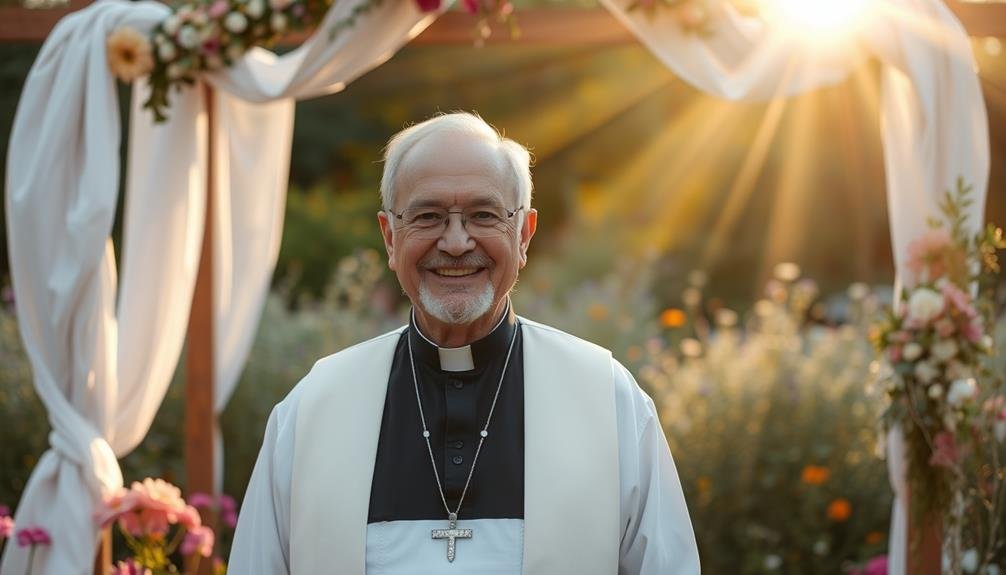
Retired clergy members often provide an excellent budget-friendly option for couples seeking an officiant. These experienced individuals have typically performed numerous weddings throughout their careers and can bring a sense of tradition and gravitas to your ceremony.
You'll find that many retired clergy are willing to officiate weddings for a fraction of the cost of active clergy or professional celebrants. They may offer their services for a small donation or even for free, especially if you have a connection to their former congregation or community.
To find retired clergy in your area, start by reaching out to local houses of worship. Explain that you're looking for a budget-friendly officiant and ask if they can recommend any retired clergy members.
You can also check with senior centers or retirement communities, as they may have connections to retired religious leaders.
When contacting potential officiants, be upfront about your budget constraints. Many retired clergy understand the financial challenges couples face and are happy to help.
Remember to discuss their style, availability, and any specific requirements they may have for performing the ceremony.
Justice of the Peace
Another budget-friendly option for couples is a Justice of the Peace. These public officials are authorized to perform civil marriage ceremonies and can be a cost-effective choice for your wedding.
You'll find that many JPs charge less than traditional religious officiants, making them an attractive option if you're looking to save money.
To find a Justice of the Peace, start by contacting your local city hall or county clerk's office. They can provide you with a list of available JPs in your area.
When selecting a JP, consider their availability, experience, and personality to guarantee they're a good fit for your ceremony.
Keep in mind that JPs typically perform simple, non-religious ceremonies. If you want to personalize your vows or add specific elements to the ceremony, discuss this with your chosen JP beforehand.
Some may be willing to accommodate your requests, while others might stick to a standard script.
Remember that laws regarding JPs vary by state, so check your local regulations to make sure you're following all necessary procedures for a legally binding marriage.
Online Ordination Services
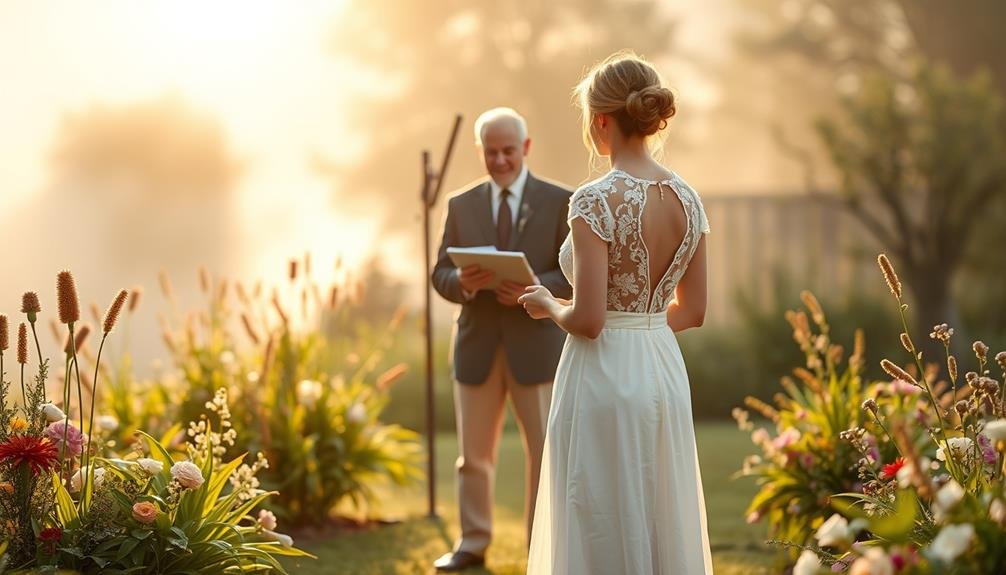
Have you considered having a friend or family member officiate your wedding? Online ordination services make this option more accessible than ever. These platforms allow individuals to become legally recognized officiants quickly and affordably, often for less than $50.
Popular online ordination services include Universal Life Church, American Marriage Ministries, and Open Ministry. The process typically involves filling out an online form, paying a small fee, and receiving a certificate of ordination. Your chosen officiant can then perform legal marriages in most states, though it's essential to check local laws for any additional requirements.
Benefits of using an online-ordained friend or family member include:
- A more personal and intimate ceremony
- Flexibility in crafting a unique wedding script
- Potential cost savings compared to traditional officiants
However, be aware that some states or counties may have restrictions on online ordinations. Research your local laws thoroughly before proceeding.
Also, make sure your chosen officiant is comfortable with public speaking and willing to invest time in preparing for the ceremony. With proper planning, an online-ordained officiant can make your wedding day even more special and budget-friendly.
Courthouse Ceremonies
Why not consider a courthouse ceremony for your budget-friendly wedding? This option offers a simple, no-frills approach to tying the knot while keeping costs low. Courthouse weddings are typically performed by a judge or justice of the peace, eliminating the need for a separate officiant.
To have a courthouse ceremony, you'll need to obtain a marriage license from your local county clerk's office. Once you have the license, you can schedule your ceremony at the courthouse. Some courthouses offer walk-in services, while others require appointments. Be sure to check your local courthouse's specific requirements and procedures.
Courthouse weddings are often quick, lasting about 10-15 minutes. You can invite a small group of friends and family to witness the ceremony, but space may be limited. After the ceremony, you'll receive a marriage certificate, making your union official.
While courthouse weddings are cost-effective, they may lack the personalization of traditional ceremonies. However, you can still make the day special by dressing up, exchanging rings, and celebrating with a small reception afterward.
This option allows you to focus on the commitment you're making without the stress of a large, expensive event.
University Chaplains
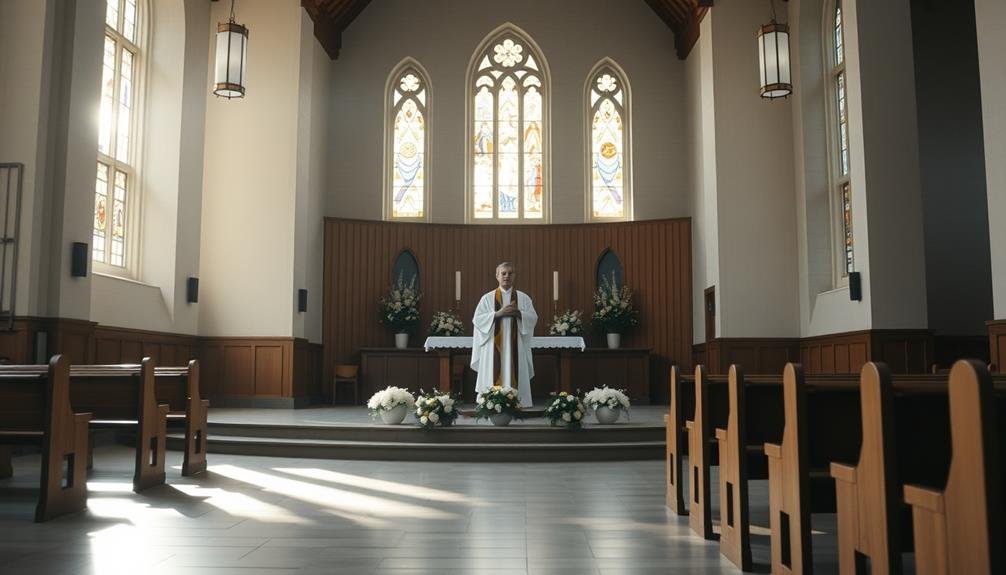
If you're looking for a more personalized ceremony than a courthouse wedding but still want to keep costs low, consider reaching out to a university chaplain.
These spiritual leaders often offer their services to the community at reduced rates or even for free. They're experienced in conducting ceremonies for diverse faiths and can provide a more intimate setting for your special day.
University chaplains are typically well-versed in various religious traditions and can tailor the ceremony to your specific beliefs or preferences.
They're often more flexible than traditional religious leaders and may be willing to perform ceremonies in unique locations. Additionally, many university chapels offer beautiful, budget-friendly venues for your ceremony.
To find a university chaplain:
- Contact local colleges or universities and ask about their chaplaincy services
- Check online directories of campus ministries in your area
- Reach out to your alma mater if you're an alumnus
Remember to book well in advance, as university chaplains may have limited availability.
Don't hesitate to discuss your vision for the ceremony and any specific requests you might have.
With their experience and flexibility, university chaplains can help you create a meaningful and affordable wedding ceremony.
Notary Publics
You might consider a notary public as an affordable officiant option for your wedding.
Notaries are typically easy to find and often charge less than traditional wedding officiants, but be aware of your state's legal requirements and limitations on their authority to perform marriages.
While notaries may offer fewer customization options for your ceremony, some are willing to work with you to create a personalized experience within their legal boundaries.
Notary Availability and Fees
Notary publics offer a readily available and often cost-effective option for couples seeking an officiant. You'll find them in various locations, including banks, courthouses, and even some UPS stores. Their fees typically range from $50 to $150, making them an affordable choice for budget-conscious couples.
When considering a notary public for your wedding, keep in mind that availability can vary. It's best to contact them well in advance to guarantee they can accommodate your chosen date and time. Some notaries may charge extra for travel or weekend services, so be sure to clarify all fees upfront.
To create a memorable ceremony with a notary public, consider these elements:
- A picturesque outdoor setting, like a sunlit garden or scenic overlook
- Personalized vows written by you and your partner
- A meaningful unity ritual, such as a sand ceremony or handfasting
Remember that while notaries can legally solemnize your marriage, they may not offer the same level of customization or spiritual guidance as traditional officiants.
However, for couples seeking a simple, no-frills ceremony, a notary public can be an excellent choice that won't break the bank.
Legal Requirements and Limitations
While notary publics offer an affordable option for officiating weddings, it's important to understand the legal requirements and limitations associated with their services.
First, check your state's laws regarding notary-officiated marriages, as not all states permit this practice. Some states require notaries to obtain additional certification or licensing to perform weddings.
Be aware that notaries may have restrictions on the type of ceremonies they can conduct. They're often limited to civil ceremonies and may not be able to incorporate religious elements.
Additionally, some states restrict where notaries can perform weddings, limiting them to specific counties or jurisdictions.
You'll need to provide proper identification and documentation for the notary to verify your eligibility to marry. This typically includes government-issued IDs and your marriage license.
Notaries are required to keep detailed records of the ceremonies they perform, so expect to sign additional paperwork.
Lastly, consider the notary's experience with weddings. While they're authorized to officiate, not all notaries regularly perform ceremonies.
Discuss their familiarity with wedding procedures and any specific requirements you may have to guarantee a smooth and legally binding ceremony.
Ceremony Customization Options
Despite some limitations, there are several ways to personalize a notary-officiated wedding ceremony. You can work closely with your notary to incorporate elements that reflect your relationship and values.
While they can't perform religious rituals, notaries can often include secular readings, personal vows, and meaningful traditions.
Consider these customization options:
- Exchange rings as you recite personalized promises to each other
- Light a unity candle symbolizing the merging of your lives
- Perform a sand ceremony, blending different colored sands to represent your union
You can also add music, poetry, or symbolic gestures that hold special meaning for you as a couple.
Don't hesitate to discuss your ideas with the notary beforehand to guarantee they're comfortable and legally able to accommodate your requests.
Celebrants-in-Training
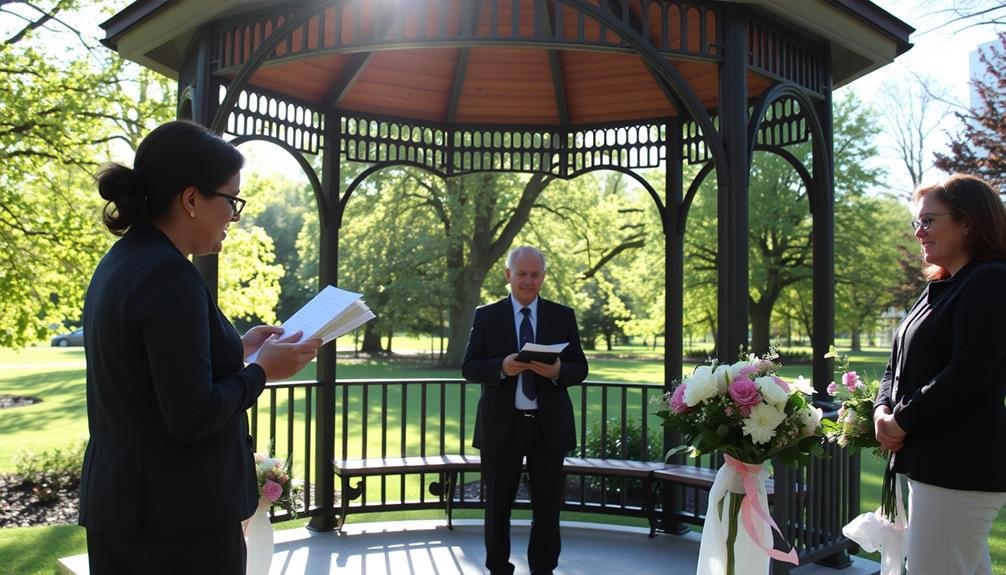
Numerous celebrants-in-training offer an affordable option for couples looking to cut costs on their wedding officiant. These aspiring officiants are often enrolled in certification programs or workshops to become licensed celebrants. They're enthusiastic to gain experience and build their portfolios, which can work to your advantage.
You'll find celebrants-in-training through local wedding planning groups, online forums, or by contacting celebrant training organizations. When considering this option, ask about their level of training, any previous ceremony experience, and their ability to customize your wedding script.
While they may not have the same level of experience as established officiants, many trainees are passionate and dedicated to creating meaningful ceremonies.
It's important to meet with potential celebrants-in-training to ascertain you're comfortable with their style and approach. Don't hesitate to ask for references or to see examples of their work.
Remember that while you may save money, you'll need to be prepared for potential inexperience. However, if you're willing to work closely with your officiant and provide clear guidance, a celebrant-in-training can be an excellent budget-friendly choice for your special day.
Religious Organization Volunteers
If you're affiliated with a religious organization, you might find a budget-friendly officiant option right within your community. Many churches, synagogues, and other religious institutions have volunteers who are trained to perform weddings. These individuals often offer their services for free or at a considerably reduced cost, especially for members of the congregation.
To explore this option, reach out to your religious leader or the organization's administrative staff. They can connect you with qualified volunteers who'd be happy to officiate your wedding. These volunteers typically have a deep understanding of your faith's traditions and can incorporate meaningful rituals into your ceremony.
When considering a religious organization volunteer, keep in mind:
- They may require premarital counseling sessions
- Their availability might be limited, so book early
- You'll need to adhere to the organization's guidelines for weddings
While religious volunteers can be an excellent budget-friendly choice, verify they're legally authorized to perform marriages in your area. Some states have specific requirements for religious officiants, so double-check local laws before finalizing your decision.
With careful planning, you can have a beautiful, meaningful ceremony that aligns with your beliefs and budget.
Humanist Celebrants
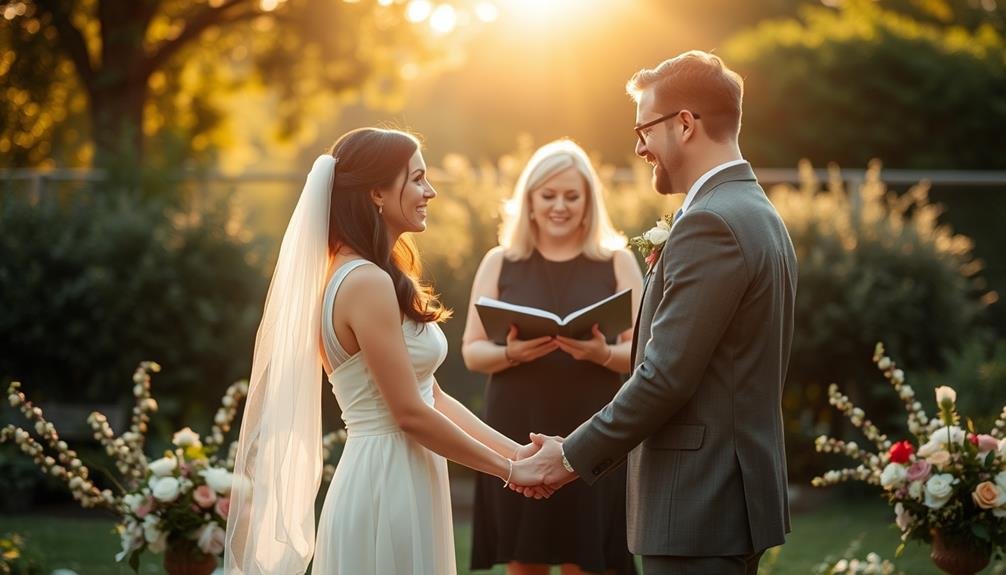
If you're seeking a non-religious ceremony that's tailored to your personal beliefs, a humanist celebrant might be the perfect choice.
These officiants specialize in crafting personalized, meaningful ceremonies without religious elements.
You'll find humanist celebrants often offer more affordable and flexible options compared to traditional religious officiants, allowing you to create a unique wedding experience that fits your budget and vision.
Personalized Non-Religious Ceremonies
Couples seeking a non-religious yet deeply personal wedding ceremony can turn to humanist celebrants. These officiants specialize in creating meaningful, customized ceremonies that reflect your values, beliefs, and personalities without religious elements.
Humanist celebrants work closely with you to craft a unique script that tells your love story and incorporates elements that resonate with you both. You'll have the freedom to choose readings, music, and rituals that speak to your relationship.
Your celebrant can help you brainstorm creative ideas to make your ceremony truly one-of-a-kind. Some popular options include:
- Sand or candle unity ceremonies
- Hand-fasting rituals
- Tree planting or wine blending ceremonies
Humanist celebrants often charge less than traditional religious officiants, making them a budget-friendly choice. You'll also save money on venue rental fees since you won't need a religious building.
By opting for a personalized non-religious ceremony, you can create a memorable experience that authentically represents your relationship while keeping costs down.
Remember to check your local laws regarding marriage licenses and celebrant qualifications to guarantee your ceremony is legally binding.
Affordable and Flexible Options
For couples seeking both affordability and flexibility, humanist celebrants offer an excellent solution. These officiants specialize in non-religious ceremonies that can be tailored to your specific preferences and beliefs.
You'll find that humanist celebrants often charge less than traditional clergy or professional wedding officiants, making them a budget-friendly choice for your morning wedding.
When you choose a humanist celebrant, you'll have the freedom to craft a ceremony that truly reflects your values and personalities. They'll work with you to incorporate meaningful rituals, readings, and personal touches that resonate with you and your partner.
You can expect a collaborative process where your ideas are welcomed and integrated into the ceremony.
Humanist celebrants are typically flexible with scheduling and location, which is especially beneficial for morning weddings. They're often willing to travel to your chosen venue, whether it's a park, beach, or backyard.
This flexibility can help you save on venue costs and create a more intimate atmosphere.
To find a humanist celebrant, check with local humanist or secular organizations, or search online directories. Many offer initial consultations at no cost, allowing you to discuss your vision and budget before making a commitment.
Military Chaplains
Military chaplains stand ready to officiate weddings for service members and their families, often at no cost. If you or your partner are active duty, reserve, or veterans, this option can greatly reduce your wedding expenses.
Chaplains are trained to conduct ceremonies for various faiths and can accommodate both religious and non-religious preferences.
To utilize a military chaplain's services, you'll need to contact the chaplain's office at your nearest military installation. Be prepared to provide proof of military affiliation and discuss your wedding plans.
Chaplains often have flexible schedules and can perform ceremonies on-base or at off-base locations, depending on their availability and regulations.
Consider these imagery-evoking aspects of a military chaplain-officiated wedding:
- A chaplain in crisp dress uniform, standing at attention before the couple
- The American flag displayed proudly behind the altar
- Fellow service members in uniform, forming a sword arch for the newlyweds
While military chaplains offer a budget-friendly option, keep in mind that their availability may be limited due to their primary duties.
It's advisable to book well in advance and have a backup plan in case of last-minute deployments or reassignments.
Frequently Asked Questions
How Far in Advance Should We Book Our Wedding Officiant?
You'll want to book your wedding officiant as early as possible, ideally 6-12 months in advance. Popular officiants can get booked quickly, especially during peak wedding season. Don't wait too long to secure this essential part of your ceremony.
Can We Write Our Own Vows for a Budget-Friendly Ceremony?
Yes, you can write your own vows for a budget-friendly ceremony. It's a personal touch that won't cost you extra. Discuss this with your officiant early on to guarantee they're comfortable with custom vows during the service.
What Documents Do We Need to Provide to Our Chosen Officiant?
You'll typically need to provide your officiant with valid government-issued IDs, birth certificates, and your marriage license. If you're divorced, bring your divorce decree. Don't forget any required pre-marriage counseling certificates or blood test results, if applicable.
Are There Any Legal Restrictions on Who Can Officiate Weddings?
Yes, there are legal restrictions on who can officiate weddings. You'll need to check your state's laws, as requirements vary. Generally, ordained ministers, judges, justices of the peace, and some government officials can legally perform marriages.
How Long Does a Typical Budget-Friendly Wedding Ceremony Last?
You'll find that a budget-friendly wedding ceremony typically lasts between 15 to 30 minutes. It's short and sweet, focusing on essential elements like vows and ring exchange. You can customize it to fit your preferences and time constraints.
In Summary
You've got plenty of options for finding a budget-friendly officiant for your morning wedding. Whether you choose a newly ordained friend, a community leader, or a celebrant-in-training, you'll save money without sacrificing the significance of your ceremony. Don't be afraid to think outside the box and explore alternatives like humanist celebrants or military chaplains. With a little creativity and research, you'll find the perfect person to make your "I do" moment special without breaking the bank.

I’m Sarah, the creator and writer behind this site. I’m a wife and a mother of two wonderful kids who keep me on my toes and inspire me daily. My passion lies in creating and organizing memorable events and group activities, where people can come together and make lasting memories.

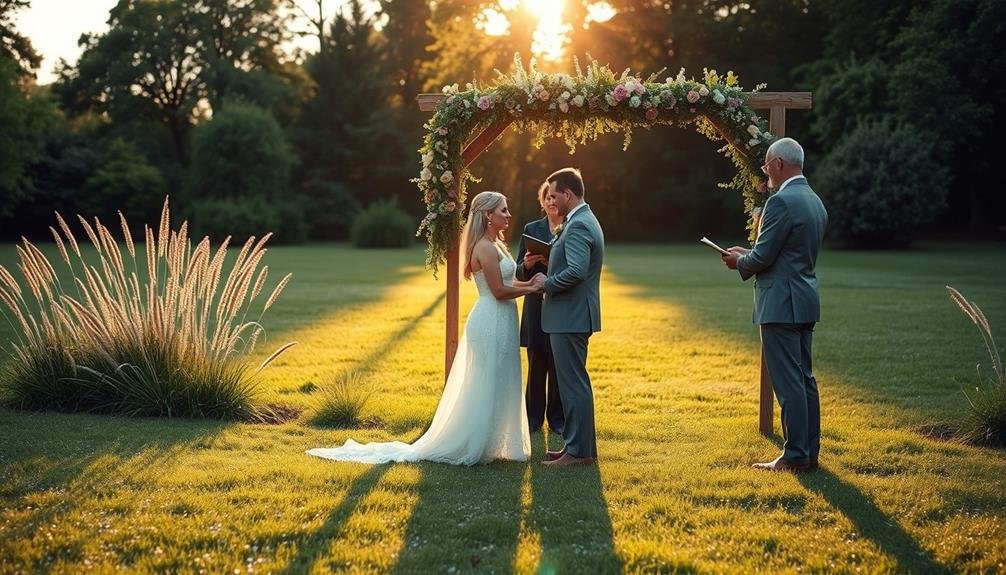



Leave a Reply